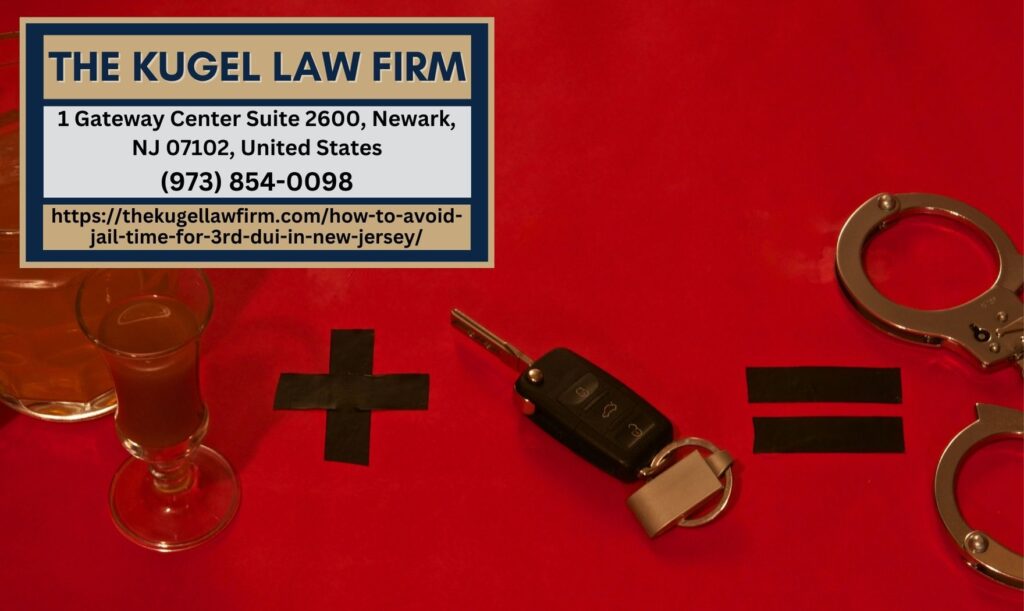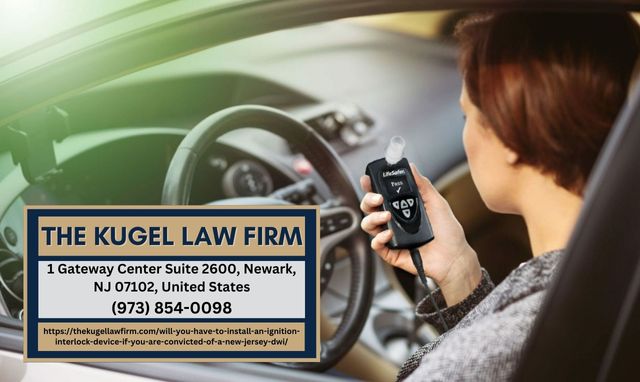A DUI charge in New Jersey can have serious consequences, but not all cases end in a conviction. Some DUI charges get dismissed, while others are reduced to lesser offenses, depending on the circumstances. Factors such as the strength of the prosecution’s evidence, potential legal errors, and the defendant’s prior record all play a role in determining the case outcome.
If you are facing DUI charges in New Jersey, having the right legal representation can make a significant difference in your case. A skilled New Jersey DUI attorney can review the evidence, identify weaknesses in the prosecution’s case, and work to secure the best possible outcome. The Kugel Law Firm has extensive experience defending DUI cases and helping clients fight for reduced charges or dismissals. Call (973) 854-0098 today to discuss your case and protect your future.
Penalties for a DUI Conviction in New Jersey
Driving under the influence (DUI) in New Jersey carries serious penalties that vary based on blood alcohol concentration (BAC) and prior offenses. A first-time offender with a BAC between 0.08% and 0.09% faces fines, up to 30 days in jail, and either a 90-day license suspension or an ignition interlock device (IID) requirement. Higher BAC levels result in increased penalties, including longer suspensions and mandatory IID installation. Second-time offenders face up to 90 days in jail, a two-year suspension, and IID installation, while a third offense leads to 180 days in jail and an eight-year suspension.
Aggravating factors, such as having a minor in the vehicle can result in additional charges and additional penalties, including license suspension and community service. Refusing a breath test also carries significant penalties, including fines and license suspension, as New Jersey law requires drivers to comply. Given the severe consequences, legal representation can help individuals navigate charges and potentially reduce or dismiss penalties.
New Jersey’s Stance on Reducing DUI Charges
New Jersey has made a major shift in how DUI cases are handled, now allowing plea bargaining for the first time in decades. While this change provides more options for defendants, plea deals remain discretionary, meaning prosecutors are not required to offer them in every case.
Historical Ban on Plea Deals
For decades, New Jersey strictly prohibited plea bargaining in DUI cases, making it one of the toughest states for DUI defendants. Unlike in other states, prosecutors had no authority to negotiate lesser charges, forcing all defendants to either plead guilty or go to trial.
- 1974 Ban on Plea Bargains: The New Jersey Supreme Court prohibited all plea bargaining in municipal courts due to concerns about fairness and professionalism. The decision was meant to prevent inconsistencies in how cases were resolved, particularly in part-time municipal courts.
- 1988 Limited Allowance: While plea bargaining was reintroduced for most municipal offenses, DUI and certain drug offenses remained exceptions. Defendants facing DUI charges had no opportunity to negotiate reduced penalties.
- 1990 Rule on DUI Exceptions: The court formally adopted Rule 7:6-2, reinforcing the ban on DUI plea bargaining. Under “Guideline 4,” prosecutors were explicitly prohibited from offering plea deals in DUI cases, meaning every defendant had to either plead guilty or fight the charges in court.
- 2024 Amendment: In a major shift, the New Jersey Legislature unanimously passed a bill permitting plea bargaining in DUI cases. The law, signed by Governor Murphy, took effect in February 2024, finally allowing prosecutors to negotiate DUI charges under appropriate circumstances.
The New Law and Its Impact
Following the new law, the New Jersey Supreme Court withdrew Guideline 4, officially removing the restriction on plea bargaining in DUI cases. While the court acknowledged potential constitutional issues related to the separation of powers, it chose to adopt the new policy rather than challenge the legislature’s authority.
Although plea bargaining is now permitted, prosecutors are not obligated to offer deals, and courts may still be hesitant to accept them. Prosecutors will likely weigh factors such as evidence strength, prior offenses, and mitigating circumstances before considering a plea deal.
The new law marks a significant shift in how DUI cases are handled in New Jersey. While plea agreements may offer a path to reduced charges, they remain at the discretion of prosecutors and courts. Defendants facing DUI charges now have more options but should still seek experienced legal representation to navigate plea negotiations effectively.

Chances of DUI Dismissal or Reduction
DUI case outcomes in New Jersey have changed significantly over the years, with conviction rates decreasing and dismissals becoming more common. While every case is different, understanding past trends can provide insight into the chances of a DUI charge being dismissed or reduced. The reduction in conviction rates could be due to increased opportunities to negotiate. They could also be explained by the vast increase in DWI charges where the intoxication by drugs is alleged. These charges can be significantly more difficult for the State to prove. It could also be that more DWI focused attorneys exist and are engaged in specialized training and experience to help them stay at the forefront of the defenses available in these cases.
What About Charge Reductions?
With changes in plea bargaining laws, the way DUI cases are resolved in New Jersey is expected to shift. Defendants may now have a greater chance of negotiating a downgrade rather than relying solely on dismissal. While conviction rates have been declining, the possibility of charge reductions adds a new layer to DUI case resolutions. As of writing and given the recency of the change in the law, there is little record of the frequency of DUI cases being reduced in the state. As mentioned, plea bargains are seldom offered by the prosecutor in DUI cases and still subject to court approval.
How Plea Bargaining Can Reduce a DUI Charge
Plea bargaining in DUI cases is now an option in New Jersey, giving defendants a potential path to reduced charges. While the decision to offer a plea deal rests with the prosecutor, defendants may negotiate for a lesser offense, such as reckless or careless driving, depending on the circumstances. However, plea bargains are not automatic and require a strong legal strategy to demonstrate why a reduction is appropriate. Old habits die hard and despite the fact that plea bargaining is now permitted, we are not necessarily seeing a wholesale increase in the willingness of prosecutors to merely reduce charges based on mitigating factors rather than hard evidence or strong defenses.
Types of Reduced Charges in DUI Plea Bargains
New Jersey law allows some DUI charges to be reduced to other traffic-related offenses under the right circumstances. The most common reductions include:
- Reckless Driving – Defined as operating a vehicle with a willful disregard for the safety of others, reckless driving carries significant penalties but is less severe than a DUI.
- Careless Driving – This charge applies when a driver operates a vehicle without due regard for safety, but without the intentional disregard required for reckless driving.
Both charges carry fines and license points but can avoid the long-term consequences of a DUI conviction, such as permanent marking on one’s driving record and the potential for jail time.
Factors That Influence Plea Bargaining
Plea bargains are not guaranteed, but several factors may impact whether a prosecutor considers reducing a DUI charge:
- First-Time vs. Repeat Offense – First-time offenders generally have a higher chance of obtaining a plea deal than repeat DUI offenders.
- Strength of the Evidence – If there are issues with the DUI evidence, such as unreliable breathalyzer results, improper police procedures, or lack of probable cause for the stop, prosecutors may be more open to reducing charges.
- Mitigating or Aggravating Factors – Circumstances like an accident, injury, or high blood alcohol concentration (BAC) may make plea bargaining less likely, while a clean record and cooperation can help.
- Character of the Defendant – military service, community involvement, employment, family life are all factors that can demonstrate that the defendant lives an otherwise law abiding life. Willingness to voluntarily seek out treatment can also be a positive factor considered by the prosecution.
| Factor | Description |
|---|---|
| First-Time vs. Repeat Offense | First-time offenders generally have a higher chance of obtaining a plea deal, whereas repeat offenders often face stricter scrutiny and less leniency. |
| Strength of the Evidence | The quality of evidence—such as reliable breathalyzer results, proper police procedures, and sufficient probable cause—affects plea bargaining decisions. Weak evidence may prompt plea offers, while strong evidence can limit the possibility of a reduced charge. |
| Mitigating or Aggravating Factors | Factors such as a clean record or cooperation can favorably influence plea negotiations. In contrast, circumstances like an accident, injury, or high blood alcohol concentration (BAC) may make prosecutors less inclined to offer a plea bargain. |
| Character of the Defendant | Military service, community involvement, employment, family life, and other factors can demonstrate that the defendant leads an otherwise law-abiding life. Willingness to voluntarily seek out treatment can also be a positive factor considered by the prosecution. |
Prosecutorial Discretion and Court Approval
Even with the new law, plea bargains require both prosecutorial discretion and judicial approval. A prosecutor may agree to downgrade a DUI charge if legal issues make it difficult to prove the case beyond a reasonable doubt. However, this must be recorded in court, and a judge must approve the resolution.
In some cases, a charge reduction may occur outside of formal plea bargaining due to evidentiary weaknesses. When this happens, the prosecutor must present the reasons for the reduction on the record, and the court must confirm that it is justified.
Plea Bargaining for DUI Refusals
New Jersey’s revised DUI law also allows plea bargaining for DUI refusal cases, where a driver declines to submit to a breathalyzer test. Since refusal is considered a strict liability offense, meaning guilt is automatic upon refusal, the ability to negotiate a lesser charge is especially valuable.
Deciding Between a Plea Deal vs. Fighting the Charge
With plea bargaining now available in New Jersey DUI cases, defendants must carefully weigh their options. The choice between accepting a reduced charge or taking the case to trial depends on multiple factors, including the strength of the prosecution’s evidence, the potential penalties, and the likelihood of securing an acquittal. While a plea deal can provide certainty and minimize risk, fighting the charges may result in a full dismissal, avoiding any conviction altogether.
When a Plea Reduction Makes Sense
Plea bargaining can be a practical option when the evidence against the defendant is strong. If the prosecution has a solid case—such as a high BAC reading, clear signs of impairment observed by officers, or field sobriety test results—fighting the charge may be risky. A conviction at trial could result in harsher penalties, including longer license suspensions, higher fines, and possible jail time.
Accepting a plea to a lesser offense, such as reckless or careless driving, can allow the defendant to avoid the most severe consequences of a DUI conviction. A reckless driving charge, for example, carries a lower maximum jail sentence and fewer long-term consequences. It also allows defendants to avoid mandatory ignition interlock device installation, which is often required after a DUI conviction. Additionally, pleading to a lesser charge prevents the uncertainty of a trial, where a guilty verdict could lead to a more serious sentence.
Downsides of Pleading
While a plea deal reduces the severity of penalties, it still results in a conviction. Even though reckless or careless driving is preferable to a DUI, the conviction remains on record, which may impact insurance rates, employment opportunities, and driving privileges. Pleading guilty to a reduced charge also means accepting fines, license points, and possibly a short jail sentence.
If the prosecution’s case has weaknesses—such as unreliable breathalyzer results, an illegal traffic stop, or procedural errors—accepting a plea may not be the best choice. In some cases, fighting the charge could result in an outright dismissal, meaning no conviction at all. A defendant should avoid rushing into a plea deal if there is a reasonable chance of winning in court.
When to Fight the DUI Charge
If there are strong legal defenses available, contesting the DUI charge in court may be the better option. DUI cases often involve procedural mistakes, flawed evidence, or violations of the defendant’s rights. Some common reasons to fight a DUI charge include:
- Lack of Probable Cause – If the officer did not have a valid reason to stop the vehicle, any evidence gathered afterward may be inadmissible.
- Breathalyzer Issues – Breath test devices must be properly calibrated, and officers must be certified to administer the test. If an error has occurred, the results may be invalid.
- Field Sobriety Test Errors – These tests can be influenced by poor lighting, uneven surfaces, or physical conditions unrelated to impairment.
- Failure to Read Miranda Rights – If the defendant was not informed of their rights upon arrest, certain statements or evidence may be excluded from trial.
If any of these factors are present, the case could be dismissed entirely, allowing the defendant to avoid all penalties. However, taking a case to trial requires time, effort, and legal strategy, making it essential to have an experienced DUI attorney assess the situation.
Making the Right Decision
The decision to accept a plea deal or fight the DUI charge should be based on a careful evaluation of the case. While a plea bargain offers a way to reduce penalties and avoid the uncertainty of trial, it also requires admitting guilt to a lesser offense. On the other hand, fighting the charge presents the possibility of an acquittal but comes with risks if the evidence is strong.
A DUI defense attorney can help weigh the pros and cons of each option, analyze the prosecution’s case, and determine the best course of action. By considering the strength of the evidence, the potential penalties, and the likelihood of success at trial, defendants can make an informed decision that minimizes the impact of a DUI arrest on their future.
The Kugel Law Firm: Experienced DUI Defense in New Jersey
Understanding the likelihood of a DUI charge reduction in New Jersey can help defendants make informed decisions about their legal strategy. While some cases result in convictions, others are dismissed or downgraded due to weak evidence, procedural errors, or strong legal defenses. The outcome of each case depends on its unique circumstances, making experienced legal representation essential.
At The Kugel Law Firm, we are dedicated to protecting the rights of those facing DUI charges in New Jersey. Our team carefully examines every detail of the case, challenges weak evidence, and negotiates for the best possible outcome. Whether you’re seeking a reduced charge or fighting for a dismissal, we are here to help. Call (973) 854-0098 today to discuss your case and take the first step toward a strong defense.
from Kugel Law Firm – DWI/DUI Defense in New York & New Jersey https://thekugellawfirm.com/what-percentage-of-dui-cases-get-reduced-in-new-jersey/





